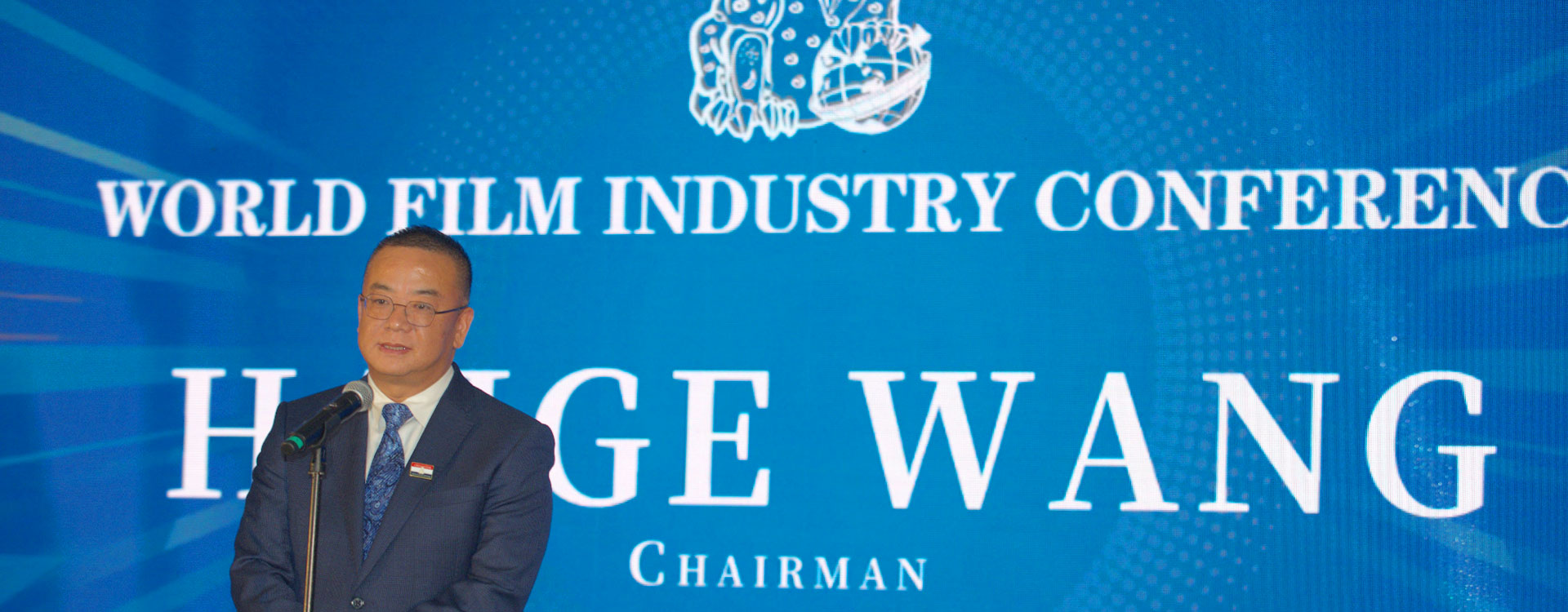
Preface
The World Film Industry Conference is a world film industry association, jointly advocated by Huading Award Group, the World Film Industry Association and the Aollywood Filmmakers' Association. This event includes cities with developed cultures and economies all over the world. The conference will invite representatives from Italy, France, Germany, Spain, the Netherlands, the United Kingdom, Russia, the United States, Australia, Japan, South Korea, Thailand, India, Singapore, Switzerland, Czech Republic, Canada, Argentina, Egypt, Colombia, Tunisia, Sweden, Poland,Estonia and other countries and held conferences in Los Angeles, New Delhi, Paris, Madrid, Cairo, China, and the Guangdong-Hong Kong-Macao Greater Bay Area in China.
In January 2022, the conference officially announced in Macau, China that the first conference will be held in Los Angeles and the Chinese Guangdong-Hong Kong-Macao Greater Bay Area in December 2022 at the same time, with the theme of "From Hollywood to Aollyhood, Dialogue Across the Pacific, and Build a Community of Shared Future for Global Films".
This charter is formulated in accordance with the "Declaration of the World Film Industry Conference" , the spirit of the establishment and the value proposition of the World Film Industry Conference.
Chapter 1 General Provisions
Article 1 Name
The name of the organization is "World Film Industry Conference" (hereinafter referred to as "the Conference") , abbreviated as WFIC.
Article 2 Nature
The General Assembly is an unofficial, non-profit, regular, non-located international organization.international organization.
Article 3 Purpose
1. Based on the Guangdong-Hong Kong-Macao Greater Bay Area in China and Los Angeles in the United States, to promote and deepen the cooperation of films and cultures around the world;
2. Provide a high-level dialogue platform for the government, enterprises, experts and scholars to discuss film, culture, society and other 2022.12.issues;
3. Through the network established by the general assembly and the film industry, politics and academia, it provides services for the growing cooperation between member of a council and other members.
Article 4 Jurisdiction
Abide by the laws and regulations of the host country and respect the local social morality and custom.
Article 5 Venue
Los Angeles, USA and Macau, China are the permanent venues of the conference.
Chapter II Business Scope
Article 6 Business Scope
The business scope of the conference includes:
1. Hold annual conferences, seminars to discuss the development of the global film industry, including important issues in the fields of finance, technology, culture and media;
2. Propose regional or global initiatives to promote and strengthen cooperation between governments and commercial entities in the film industry;
3. Track trends affecting the global film industry;
4. Identify various issues that may affect the film industry; collect and publish relevant information to highlight opportunities for cooperation in the global film industry;
5. Through the working network established by the forum, enhance the connection between enterprises inside and outside the region;
6. Utilize research institutions to provide advanced management experience and technology for business groups;
7. Independently or cooperatively carry out various activities such as conferences-exhibitions, information-exchange, education-training, and film-investment that are conducive to the realization of the purpose of the conference.
Chapter III Directors
Article 7 Classifications of directors
1. The general assembly has a presidium, a standing council and a council meeting.
2. The members of the presidium refer to the representatives sent according to the quota allocated by the participating countries of the leaders' Summit (1 for each country), the sponsors of the conference and the enterprise representatives with a certain amount of sponsorship (the scale of enterprise sponsorship meets the requirements of the conference);
3. Members of the Standing Council refer to the representatives of countries around the world who have made important and substantive contributions to the establishment and development of the conference (can be former national dignitaries), spiritual leaders of the global film and television culture industry and enterprise representatives with a certain amount of sponsorship (the scale of enterprise sponsorship meets the requirements of the conference);
4. Members of the board of directors refer to the leaders of the global film and television culture industry, the secretaries general and deputy secretaries general of the forums under the world film industry conference, the presidents and secretaries general of the associations in Aollyhood, the presidents of the major film festivals in the world and the mayors of the cities where they are held, the presidents and secretaries general of the film industry associations in major countries in the world, and the individuals, enterprises and representatives.who attend and observe the annual meetings and other business activities of the conference have settled one-time payment and their applications have been approved.
Article 8 Conditions of Directors
1. Willing to join the conference;
2. Agree to abide by the Articles of Association;
3. Has a certain influence in the related field;
4. Willing to fulfill the obligations of the board of directors of the General Assembly.
Article 9 Accession
The applicant shall submit a written application in accordance with the procedures stipulated by the conference, which shall be reviewed and approved by the relevant institutions of the conference.
Article 10 rights of directors
Directors have the following rights:
1. The right to speak and vote at the Council meeting and the right to elect and stand for election of members of the Standing Council;
2. The right to make suggestions on the topics of the annual meeting and other activities of the conference;
3. Participate in the annual meeting of the General Assembly;
4. Prioritize direct communication with leaders in government, business and academia;
5. Obtain the information provided by the conference, and priority to the economic information database of the forum website with authorization ;
6. Seek business opportunities through the network established by the conference;
7. Seek intellectual help from the research institutions of the conference;
8. Entrust the conference to hold special seminars on issues of concern;
9. Entrust the conference to conduct market analysis and legal consultation on its business development plan;
10. Entrust the conference to recommend or train talents;
11. Priority to enjoy the right to host or sponsor various activities held by the forum;
12. Authorized to enjoy the sponsorship rights of "World Film Industry Conference";
13. Obtain the annual audit report submitted by an audit firm with international qualifications;
14. Enjoy all kinds of preferential treatment given to the conference by the host place;
15. Enjoy other rights conferred by the General Assembly Council.
However, some governing enterprises should enjoy the above rights, and the General Assembly will charge appropriate fees.
Article 11 obligations of directors
The duties of directors include:
1. Comply with and implement the resolutions of the General Assembly;
2. Comply with the articles of association and relevant regulations of the General Assembly;
3. Attend the board meeting and related activities on time;
4. Protect the legitimate interests of the General Assembly;
5. Pay the director's fee in accordance with the relevant provisions of the general assembly;
6. Provide authentic and reliable materials and information to the conference;
7. Other relevant obligations stipulated by the General Assembly Council.
Article 12 withdrawal of directors
1. Directors have the right to withdraw from the an assembly;
2. When a director decides to withdraw from the conference, he shall notify the general secretary of the conference in writing two months in advance. Membership shall be terminated upon receipt of written confirmation from the Secretariat;
3. The withdrawal procedure of directors shall be implemented in accordance with the relevant provisions of the rules for the recruitment of directors.
Article 13 termination of director qualification
If any director commits an illegal act or has lost contact with the general assembly for more than two years, the Executive Committee of the general assembly has the right to terminate his qualification as a director with the consent of the general assembly, but shall notify the director in advance, and the director has the right to request a hearing.
Chapter IV Organizational Structure ; Appointment and Removal of Officials
Article 14 Organization
The main organization of the conference is as follows
1. Board meeting;
2. The Standing Council:
3. Executive Committee;
4. Research institutes (think tanks);
Article 15 board meeting
(1) The Council meeting is the highest authority of the general assembly and is held once a year. The Executive Committee shall be responsible for the preparation of the Council meeting, and all directors shall be notified of relevant matters in advance.
(2) If the notice of convening the meeting is not delivered to one or some directors due to force majeure, or one or some directors fail to attend the general meeting for some reason, the process of the general meeting will not be affected if a quorum is met.
(3) Powers of the board of directors:
1. Deliberating and approving the articles of association or amendment proposal of the articles of Association;
2. Election of members of the Standing Council;
3. Adopt the annual work report and annual budget submitted by the Executive Committee and considered by the Standing Council;
4. Other matters specified in the agenda of the session of the general assembly;
5. Other written motions proposed by the directors at the general meeting shall be signed by at least one quarter of the directors and submitted to the Executive Committee two weeks before the meeting.
(4) The resolution of the board meeting shall be adopted by more than half of all directors participating in the meeting.
(5) The chairman of the board meeting shall be the chairman. If the chairman is unable to attend, he shall entrust the vice chairman or an executive director to exercise his duties in his place. The chairman of the first council meeting of the general assembly is a dual chairman system. In theory, the heads of China and the United States serve as the dual chairmen.
Article 16 quorum and voting of the board meeting
The quorum for attending the board meeting is two-thirds of all directors.
All directors have the right to vote at the general meeting or special meeting of the general meeting. Voting shall be by show of hands or by secret ballot at the request of at least three directors or one member of the Standing Council. According to the relevant rules formulated by the general meeting of directors, directors are allowed to designate representatives to vote.
Article 17 special meeting of the board of directors
When the board of directors is not in session, the Standing Council has the right to convene a special meeting of the board of directors according to the written proposal of more than one quarter of the directors to discuss relevant urgent matters that cannot be postponed to the next board of directors.
Article 18 The Standing Council
1. The Standing Council is the highest executive body of the board of directors and is responsible to the board of directors;
2. The members of the Standing Council shall be elected by a simple majority of the members of the General Assembly at the general meeting of directors;
3. The Standing Council shall hold a meeting once a year, which shall be held at the headquarters of the General Assembly at the same time as the general assembly;
4. Upon the proposal of more than three executive directors and the consent of the majority of executive directors, the chairman may convene a special meeting of the Executive Council.
Article 19 composition of the Standing Council
1. The Executive Council is composed of executive directors. The term of office of the first Executive Council is 4 years. The executive director may be re elected, but the term of office shall not exceed two terms. The Standing Council shall be elected by the Council meeting. In the election process, consideration shall be given to maintaining the continuity of the implementation of the policy direction and vision of the meeting;
2. Executive directors are elected from influential former politicians, senior officials, experts and scholars, business leaders and other people in various countries, and can be re elected for a term of no more than two terms;
3. The Secretary General of the general assembly and the chief representative of the host country are ex officio executive directors;
4. The composition of the Standing Council shall pay attention to the principle of geographical balance, and no more than four standing directors shall come from the same country or economy;
5. The number of executive directors can be increased or decreased after being approved by the Executive Council.
Article 20 chairman and vice chairman
1. The Standing Council has a chairman and a vice chairman;
2. The chairman and vice chairmen shall be elected by more than two-thirds of the standing directors attending the meeting of the Standing Council. The selection of candidates shall pay attention to the principle of geographical balance;
3. The Vice President shall be the chief representative of the host country;
4. The term of office of the first chairman and vice chairman is 4 years;
5. If the chairman is unable to hold his post for some reason, the vice chairman shall act as the acting chairman until the next board meeting; The term of office of the chairman elected at the meeting shall be the remaining term of office of the former chairman.
Article 21 duties of the general assembly and the Standing Council
The duties of the Standing Council include:
1. Supervise and manage the activities of the whole assembly;
2. Consider the annual work report and annual budget of the General Assembly submitted by the Executive Committee to the governing assembly;
3. Appoint the Secretary General and Deputy Secretary General of the Executive Committee;
4. Review the amendment proposal of the articles of association of the general assembly;
5. Approve major rules and regulations of the general assembly;
6. Decide on the convening of the board meeting, also consider and adopt the agenda of the board meeting;
7. Other duties authorized by the board of directors.
Article 22 generation of resolutions of the Standing Council
Except the special Articles provided in Association and other relevant rules, the resolutions of the Standing council shall be passed by a simple majority of all directors present at the meeting of the council and take effect. Each director has one vote. The Standing Council may also take a non-meeting format to make decisions on major issues or urgent matters of the Forum.
Article 23 Duties of the Chairman
The chairman's responsibilities shall be:
1. Preside over the meetings of the Standing Council and the general meeting of the board of directors;
2. To supervise the formulation of medium and long-term plans and projects that help to achieve the purpose of the forum and promote the interests of the conference;
3. With the authorization of the Standing Council, it can sign non-consensual, non-binding and non-administrative correspondence and letters on behalf of the General Assembly;
4. Report to the board of directors on the work of the Standing Council;
5. Perform other duties assigned by the Standing council.
Article 24 Duties of the Vice Chairman
1. Assist the chairman to perform his duties;
2. When the chairman cannot perform his duties, perform the duties of the chairman on his behalf;
3. Support and guide the daily affairs of the Executive Committee of the general assembly;
4. Exercise other duties entrusted by the Standing Council.
Article 25 Executive Committee
The executive committee is the permanent executive body of the general assembly, and its responsibilities are as follows:
1. Responsible for the preparation of all meetings of the conference;
2. Resolutions of the executive board meeting and the Standing Council;
3. Prepare the annual work report and annual budget of the conference and submit it to the standing council for deliberation;
4. Responsible for the fundraising and operation of the conference;
5. Be responsible for drafting or revising the rules and regulations of the conference and reporting to the standing council for approval;
6. Be responsible for the directors' entry, exit, daily contact and other related services;
7. With the assistance of think tanks (research institutes), organize and draft the publication of economic forecasts related to forum business;
8. With the assistance of the think tank (research institute), be responsible for providing intellectual resources for the annual meeting, seminars and other special meetings of the conference;
9. With the assistance of think tanks (research institutes), provide human resources training for members and other partners;
10. With the assistance of think tanks (research institutes), be responsible for establishing networks and information exchange centers around the world;
11. Responsible for other affairs entrusted by the standing council;
12. Assist the chairman to perform his duties.
Article 26 Secretary General
The secretary-general is the legal representative of the conference, the chief executive officer and leads the executive committee. The term of office is three-year, which can be extended with the approval of the standing council, but the term of office shall not exceed two terms. Its responsibilities are as follows:
1. Responsible for the daily affairs of the conference and external representatives of the conference;
2. Preside over all meetings of the general assembly except the meetings of the board of directors and the Standing Council;
3. Implement the rules and regulations approved by the standing Council;
4. Hiring, promoting and dismissing the staff of executive committee;
5. Propose a proposal to adjust the functional departments of the executive committee or the general assembly office, and submit it to the Standing Council for deliberation and approval;
6. Responsible for other affairs entrusted or authorized by the council.
Article 27 Deputy Secretary-General
As decided by the standing Council, the General Assembly shall appoint several Deputy Secretary-Generals. The Deputy Secretary-General may be nominated by the Secretary-General and appointed or removed by the standing Council. If other directors nominate the deputy secretary-general, they shall obtain the approval of the secretary-general before submitting to the standing council for approval. The term of office of the Deputy Secretary-General is three-year and could be extended upon approval of the standing Council.
The responsibilities of the Deputy Secretary-General are as follows:
1. Responsible for the daily affairs of the conference and external representatives of the council;
2. Preside over all meetings of the general assembly except the meetings of the board of directors and the Standing Council;
3. Implement the rules and regulations approved by the standing Council;
Article 28 Termination of secretary general and deputy secretary general
The Secretary-General and the Deputy Secretary-General shall terminate their duties in the following cases:
1. Submit a written resignation to the chairman three months in advance;
2. More than two-thirds of the directors of the board have passed the resolution of dismissal. In this case,secretaries have the right to request a hearing;
3. Unable to perform their duties;
4. Subject to criminal punishment.
Article 29 Research Institute (Think tanks)
The Institute is an important intellectual support organization for the Forum. Its main functions include: putting forward the themes and topics of the annual conference based on the research and analysis of the world film and cultural industry; organizing, drafting and publishing forecasts related to the business of the conference; responsible for providing intellectual resources for the annual conference, seminars and other special meetings of the conference ; Provide human resources training for directors and other partners; be responsible for establishing a global network and information exchange center.
Chapter V Asset Management and Use
Article 30 Sources of funds for the conference
1. Directors' fees;
2. Participation fee;
3. Donation;
4. Government funding;
5. Income from activities or services within the business scope of the conference;
6. Interest on the funds of the conference;
7. Other legal income.
Article 31 Use of Funds
All the funds of the conference shall be used for the realization of the purpose of the conference, and shall be used within the scope stipulated in this charter and its related rules.
Article 32 Financial Management
Comply with accounting standards accepted internationally and host country financial regulations to ensure that all accounting information is legal, true and complete.
The accounts of the General Assembly shall be audited annually by an internationally accredited accounting firm.
For the insurance, welfare and other treatment of the official staff of the conference, refer to the relevant administrative regulations of the host country.
Chapter VI Amendments to the Articles of Association
Article 33 Amendment procedures of the articles
1. The amendment to the articles of association shall be submitted by the Executive Committee of the general assembly to the Standing Council for deliberation and approved by the General Council;
2. The amendment to the articles of association shall come into force after it is adopted by the board meeting and approved by the registration authority.
Chapter VII Dissolution of the General Assembly
Article 34 Dissolution procedure
The dissolution of the World Film Industry Congress shall be carried out in accordance with the following procedures:
1. After being deliberated by the Standing Council, the dissolution proposal of the General Assembly shall be submitted to the board of directors of the general assembly;
2. The board meeting reports to the Presidium and makes a resolution to dissolve the meeting according to the above proposal;
3. The resolution of the dissolution meeting shall be notified to the registration authority of the host country.
Before the dissolution of the general assembly, a liquidation committee shall be established in accordance with international practices and the laws and regulations of the host country to clean up the assets and liabilities of the general assembly.
After paying debts and refunding director’s fees in accordance with relevant regulations, any remaining assets of the conference should be donated or used for the development of causes related to the purpose of the conference under the supervision of the registration authority.
Chapter VIII Supplementary Provisions
Article 35 Articles of Association
Matters not covered in this charter shall be regulated in the relevant rules; the rules shall come into effect after being approved by the standing Council.
Article 36 Language
The official languages of the conference are English and Chinese.
Article 37 Interpretation
The interpretation of this charter belongs to the Standing Council of the general assembly.
Article 38 Entry into force
This constitution is currently a trial version, and the official version will be finalized and announced after discussion at the first World Film Industry Conference in December 2022.





